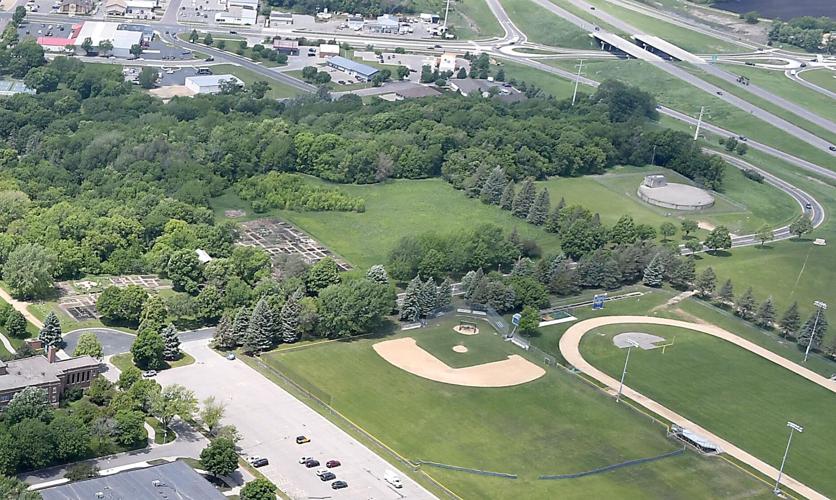A year after the School Sisters of Notre Dame moved away, plans for the third life of Mankato’s Good Counsel Hill are beginning to arrive at City Hall for review and approval.
The large and scenic campus was once a regional headquarters for the School Sisters and a residential girls’ school. In recent decades, after Good Counsel Academy closed, portions of the property transitioned into assisted living services for the increasingly elderly members of the congregation of Roman Catholic sisters.
The next phase will be a private sector redevelopment that will make its first appearance before the Mankato Planning Commission this week. Public comment will be taken by the commission Wednesday night and later the City Council, which is expected to vote on the general concept for the redevelopment in November.
“This is just the very, very initial step,” said Mark Konz, associate director of planning and redevelopment for the city.
But even the high-level vision of local developer Mike Drummer for the landscaped grounds, forested hillsides and stately brick buildings is likely to prompt varied public reaction.
For people looking for rental options in a tight housing market, there could be applause for Drummer’s plans to transform some of the sisters’ former residential buildings into nearly 250 apartments — some possibly renting for as little $600 a month.
Would-be homeowners interested in building on lots with mature trees in the heart of Mankato could be attracted by the 28 to 38 single-family homes or duplex units to be constructed on vacant portions of the property.
And those who liked Good Counsel just the way it was may find Joni Mitchell lyrics running through their heads as they look at the site plan concept. The 111-year-old campus was a piece of Eden in the eyes of many community members who attended church services and concerts in the ornate chapel or fondly recall their school days at Good Counsel Academy — an attitude summed up by a Good Counsel alumnus attending a farewell open house there in August of last year: “It’s kind of like a miracle set down in the middle of town.”
The concept plan shows a future Good Counsel with some of its green space replaced by parking lots and a resurrected street connecting the hill to Thompson Ravine Road. Drummer is pledging, however, to preserve as much of the picturesque nature of the campus as possible, to maintain the chapel as a community asset and to pay tribute to the School Sisters’ place in south-central Minnesota’s history.
Decision time
Local residents began expressing concern about what would replace Good Counsel almost immediately after leaders of the SSND’s Central Pacific Province confirmed in spring of 2021 that the Mankato property would be one of several that would be sold to spare the shrinking organization from the burdens of property management while generating funds to care for the increasingly elderly sisters.
Ownership of the academic buildings and athletics fields used by Loyola Catholic School shifted to the pre-K-12 parochial school system, but the fate of the remainder of the property was uncertain and sometimes controversial. Homeowners in the Tourtellotte Park area at the foot of the hill rose up in opposition to one potential developer’s suggested reuse of the former cow pasture, once home to the School Sisters’ dairy herd, across North Fourth Street from the single-family residential neighborhood.
The initial concept presented by the Southwest Minnesota Housing Partnership, an affordable housing developer, contained a three-story apartment building, a large parking lot and as many as 49 townhouses on roughly eight acres just down the hillside from the Good Counsel campus.
Later, Adult and Teen Challenge — an organization that operates inpatient drug and alcohol treatment facilities across Minnesota — announced plans to purchase two Good Counsel buildings for the creation of a residential treatment facility housing about 70 men. More than 200 people, mostly Loyola parents opposing the idea, showed up at a neighborhood meeting in May in an effort to derail the plan.
The City Council declined to weigh in on either of the concepts, saying it would wait for specific proposals to be submitted to the city.
That moment has arrived.
The first step is an application to amend the Mankato Land Use Plan to change the designation of the non-Loyola portion of the Good Counsel property. Drummer is requesting that two open pieces of land be designated “low-density residential” for the construction of new homes and the remainder of the campus become “office/residential,” which would allow for apartments.
After the Planning Commission makes a recommendation, the council is expected to schedule a vote on the request following a public hearing Nov. 13.
If approved, future meetings — often with public comment opportunities — would be needed to rezone the property, approve preliminary and final plats, review more detailed site plans and possibly rule on conditional-use permits.
“The council will have the ability to review every use that goes on that property,” Konz said.
The general idea
Drummer, who has a purchase agreement with the School Sisters, didn’t respond to interview requests from The Free Press last week, but his representative laid out the broad vision for the property in an Aug. 29 document sent to the city’s Community Development Department.
Officials with Adult and Teen Challenge announced in June that they plan to seek a different location in Mankato, and there’s no mention of a residential treatment program in documents submitted for review by the Planning Commission and the City Council. Instead, the 100 apartments Drummer was contemplating previously have more than doubled now that Adult and Teen Challenge is no longer pursuing Good Counsel buildings.
The new concept for the former pasture near Tourtellotte Park is for 10 residential structures that could be single houses or duplexes. But the maximum number of units of 20 is a substantial change from the 83 floated by the Southwest Minnesota Housing Partnership two years ago.
The proposed houses or duplexes “would be consistent with the other homes in the area,” wrote Nate Myhra of Bolton and Menk, who prepared the application materials on behalf of Drummer.

The land west of the Loyola athletics fields is slated for 18 single-family “senior cottage-style homes,” one of the components of a broad residential redevelopment plan for the Good Counsel campus.
On the northern side of the Good Counsel hill — just west of the Loyola athletic fields — the new plan shows 18 single-family homes, described as cottage-style housing targeted toward retirees.
“The proposed development provides different types of housing ranging from apartments to single-family to multi-family,” Myhra wrote. “The housing will be available for all age groups and demographics.”
Transition, preservation
Substantial change is virtually inevitable when converting a property that was designed and built as a convent and boarding school into private apartments and owner-occupied houses.
Drummer, though, is committed to maintaining the historic charm of Good Counsel as much as possible, according to Myhra.
“The plans are not to change any of the exterior facades of the buildings and leave as much green space as possible,” he wrote to the city. “... The buildings that are in existence will be enhanced within and left in their historically significant exterior appearances.”

The Romanesque chapel on the Good Counsel campus will be preserved as a nonprofit event center under redevelopment plans that will transition much of the campus into residential uses.
The documents describe an event center hosting weddings and corporate events in the Romanesque-style church, which features 60 stained-glass windows and imported marble and tile from Italy and Germany.
Drummer, speaking of his plans in May, said his intention was to preserve the chapel in perpetuity, making it a nonprofit community asset. He also said he planned to create a “heritage room” to display statuary, artwork, photos and other memorabilia to showcase the history of the sisters and Good Counsel.
But that history wasn’t an automobile-focused one. Even when there were sisters and boarding school students living on The Hill topped 700, the overwhelming majority didn’t own a vehicle and the non-Loyola portion of the campus appears to have fewer than 100 outdoor parking stalls. That’s a fraction of what would be required for the 244 apartments Drummer is planning.
Konz said the city generally requires two stalls per unit for apartment buildings, and the event center would likely increase the mandated number. The preliminary site concept plan shows new parking lots east and north of the water tower totaling 125 and 45 stalls, respectively. On the east side of Marian Hall, a lot of about 64 stalls is shown. Both areas are now green space.

A preliminary concept plan for the redevelopment of the Good Counsel Hill shows the roughly 425 parking spots planned around the buildings at the heart of the campus, which will be transformed into 244 apartments. The pink squares on the north side are to be cottage-style homes and the blue squares near Tourtellotte Park will be either single-family homes or duplexes.
Other lots — totaling nearly 200 stalls — are shown in a handful of places close to the chapel, Isidore Hall and St. Joseph’s Hall, some of which are already used for parking and access roads.
Myhra’s letter pledged that landscaping in and around the parking lots “will be thoughtfully designed to enhance the site appearance and provide a comfortable space for residents.”
It was also noted that more than half of the property Drummer is prepared to buy will not be altered. Development on the wooded hillsides is prohibited, and a large solar array and Conservation Reserve Program land will be untouched.
“The property is over 100 acres,” Myhra wrote. “... Much of the inherent beauty of the property will not be changed.”
The community garden the School Sisters created on the campus also may continue if organizers wish: “There is space on the southern portion of the property for the continuation of the community gardens if they so desire.”
Hopeful but attentive
Mike Spellacy, who lives on North Second Street and once represented the Tourtellotte Park neighborhood on the City Council, said he’s spoken to a few neighbors in recent days about Drummer’s plans.
“I think the term might be ‘cautiously optimistic,’” Spellacy said of their reaction. “Having a local contractor/developer involved is relieving to some people’s minds, and he has a strong reputation for listening to people. ... All of this kind of leads us to lower our blood pressure a little bit.”
For Spellacy’s neighborhood, the less ambitious reuse of the former pasture is a particular relief.
“This seems a lot more palatable to people just because of the scope and reducing the scale of it,” he said.
Nonetheless, there will be residents on hand at 6 p.m. Wednesday for the Planning Commission meeting, watching for more details on traffic impacts of the development, whether adequate green space will be maintained, how access roads will be designed and more.
Some of those topics are already beginning to be studied. A traffic impact analysis was completed in August by Kevin Mackey of Bolton and Menk, and a summary memo sent to Drummer was included with the land use amendment application. The study, which assumes the property will be fully developed by 2028, estimated the development will generate 1,378 additional daily trips on weekdays.
Much of the added traffic will travel down Good Counsel Drive to North Riverfront Drive, but a restored access road will allow traffic on Good Counsel Drive to use an alternate route connecting to Thompson Ravine Road. The analysis determined the second access point is necessary before the hilltop apartments open to avoid “failing operations” at the intersection of Riverfront Drive and Good Counsel Drive.
Even with the restored road, which would be a private street constructed by Drummer, certain turn movements are expected to perform poorly during heavy traffic hours at the Riverfront Drive intersection and at the intersection of Thompson Ravine Road and North Victory Drive by 2028, according to the analysis. But that would be the case even without the Good Counsel development, meaning intersection upgrades are probably likely in any case due to general growth in the community.
As the permit reviews continue into 2024 and beyond, Spellacy said his neighborhood will be watching and asking questions.
“It’s going to be a long process,” he said.




























Commented
Sorry, there are no recent results for popular commented articles.